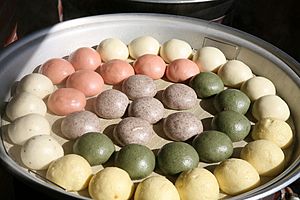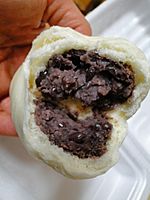Jjinppang facts for kids

Jjinppang of many colors in a steamer
|
|
| Alternative names | Steamed bun |
|---|---|
| Place of origin | Korea |
| Associated national cuisine | Korean cuisine |
| Serving temperature | Hot |
| Main ingredients | Wheat flour, red bean paste |
| Ingredients generally used | Yeast from makgeolli, butter, salt, sugar |
| Variations | Hoppang |
| 177 kcal (741 kJ) | |
| Similar dishes | Liánróngbāo Begodya |
| Korean name | |
| Hangul |
찐빵
|
|---|---|
| Revised Romanization | jjinppang |
| McCune–Reischauer | tchinppang |
| IPA | [t͈ɕin.p͈aŋ] |
Jjinppang (Hangul: 찐빵) is a steamed bun, typically filled with red bean paste with bits of broken beans and bean husk. Traditional jjinppang is made of sourdough fermented using the yeast in makgeolli (rice wine), but younger varieties such as hoppang are often made without fermentation. Warm jjinppang is softer than baked breads due to the higher moisture content, but it hardens as it cools. Thus it is recommended to eat while the bun is still hot. Hardened jjinppang can be steamed again before eaten.
Jjinppang is a specialty product of Anheung Township in Hoengseong County, Gangwon Province. In the township, there is Anheung Jjinppang Village where 17 steameries that make Anheung-jjinppang (안흥찐빵). Since 1999, the township also hosts Anheung Jjinppang Festival in every October.
Varieties
- Anheung-jjinppang – a variety of jjinppang made in traditional way, using sourdough fermented with the yeast from makgeolli; a specialty of Anheung.
- gamgyul-jjinppang – mandarin orange jjinppang, made and sold in Jeju Island. The orange-colored dough is made with mandarin orange.
- hoppang – a variety of jjinppang filled with sweeter and smoother red bean paste, passed through a sieve to remove bean skins.
Gallery


